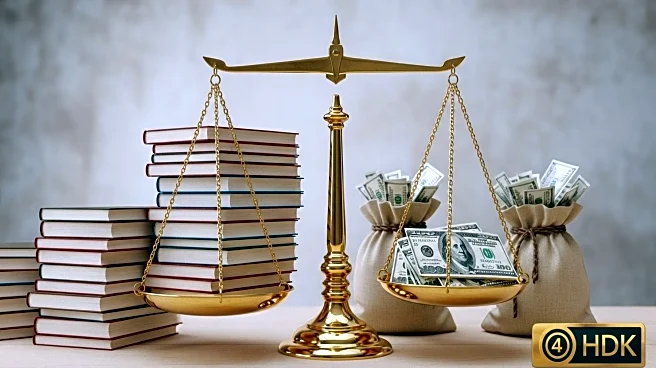What's Happening?
Anthropic, a leading artificial intelligence company, has reached a tentative settlement in a class-action lawsuit filed by a group of authors. The settlement, which could amount to $1.5 billion, is pending judicial approval and is considered potentially the largest copyright recovery in history. The lawsuit alleged that Anthropic used unauthorized copies of literary works to train its AI chatbot, Claude, involving approximately half a million works. Authors could receive an average of $3,000 per work if the settlement is approved. This case is significant as it may set a precedent for how AI companies handle copyrighted material. Anthropic's deputy general counsel, Aparna Sridhar, stated that the court's findings affirmed the company's training methods as 'fair use.'
Why It's Important?
The settlement is crucial as it addresses the growing tension between creative professionals and AI developers over copyright issues. It highlights the need for clear guidelines on the use of copyrighted material in AI training. The outcome could influence future legal battles, as many authors, including prominent figures like George R.R. Martin and John Grisham, have filed similar lawsuits against AI companies. This case may serve as a benchmark for defining fair use and copyright boundaries in the AI industry, impacting how AI technologies are developed and utilized. The settlement also reflects a broader trend of artists and publishers challenging AI firms over perceived copyright violations.
What's Next?
If the settlement receives judicial approval, it could lead to more lawsuits from authors and creators seeking compensation for unauthorized use of their works in AI training. AI companies may need to revise their practices to ensure compliance with copyright laws, potentially affecting the development and deployment of AI technologies. The legal landscape surrounding AI and copyright is likely to evolve, with this case serving as a reference point for future disputes. Stakeholders in the AI industry, including developers and legal experts, will closely monitor the outcome to understand its implications for intellectual property rights.
Beyond the Headlines
The case raises ethical questions about the balance between technological advancement and the protection of intellectual property rights. It underscores the need for AI companies to engage with creators and establish fair compensation models for the use of copyrighted material. The settlement may prompt discussions on the ethical use of AI in creative fields and the responsibilities of AI developers in respecting the rights of authors and artists. As AI continues to integrate into various industries, the resolution of such legal disputes will be critical in shaping the future of human-machine collaboration.










